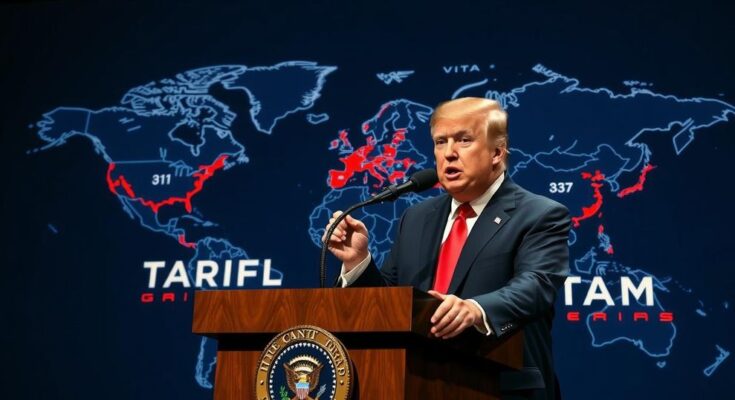Donald Trump announced tariffs targeting Mexico, Canada, and China, raising concerns about global trade impacts and potential retaliatory measures. These tariffs, justified by accusations against these nations, could severely affect supply chains and consumer prices in the US. European companies have been on alert, fearing future tariffs, while economies worldwide brace for potential fallout.
European companies expressed relief as Donald Trump announced trade tariffs primarily targeting Mexican, Canadian, and Chinese goods, believing they had initially escaped the brunt of his trade policies. However, Trump’s aggressive rhetoric signals potential economic ramifications for global trade, reminiscent of his 2016 stance where tariffs were wielded as leverage in foreign policy. This time, he accused these nations of complicit behavior in drug trafficking, necessitating tariffs to curb illegal immigration and fentanyl distribution.
Trump declared that Mexico and Canada would face a 25% import tariff, while China might see an additional 10% tariff if it fails to comply with unspecified demands from the new administration. Despite this focus, experts remain warily vigilant, anticipating that Europe and the UK could become targets for future tariffs.
Chris Turner from ING commented on the uncertainty surrounding Europe, stating that, although the absence of Europe from Trump’s initial tariff announcement might be a temporary reprieve, apprehension lingers regarding potential future tariffs, particularly on the European auto sector. The immediate fallout was evident as shares of various European automakers plunged, signaling market concerns over the anticipated trade war effects.
Economists warn of broader consequences if tariffs are enacted, particularly regarding US economic stability. As Canada, Mexico, and China accounted for substantial trade volumes with the US, retaliatory tariffs could significantly disrupt the interconnected supply chains vital for industries like automotive manufacturing. Flavio Volpe, president of the Automotive Parts Manufacturers’ Association, noted the deep integration of US and Canadian automotive production, which disrupts both countries’ economic health. Moreover, the implications for consumers could be severe, with estimates indicating that the new tariffs might inflate costs by up to $2,400 per household annually.
In the face of these developments, experts such as Paul Donovan from UBS Wealth Management highlighted the urgency for US businesses to prepare for swift market changes, particularly in an environment where tariffs could deter consumption and disrupt critical supply chains. Notably, Canadian officials stressed their essential role in supporting US energy supply, signaling an intention to maintain dialogue with the incoming administration.
Donald Trump’s announcement of potential trade tariffs aims to penalize Mexico, Canada, and China for alleged complicity in drug trafficking and immigration issues. His previous presidency saw the use of tariffs as a tool for national security and foreign policy leverage. The current economic climate has invoked fears that such tariffs may trigger retaliatory measures from these countries, further complicating global trade dynamics. Economists have raised alarms about the potential fallout on US economic health, particularly with regard to integrated supply chains, inflationary pressures for consumers, and overall effects on global trade.
In conclusion, Trump’s proposed tariffs raise significant concerns for global trade dynamics and economic stability, particularly impacting relationships with Mexico, Canada, and China. The broader implications of these tariffs may expand beyond initial targets, potentially affecting Europe and the UK. As industries that rely heavily on cross-border supply chains could face severe disruptions, stakeholders in both the US and abroad must prepare for the economic consequences of these trade decisions.
Original Source: www.theguardian.com




